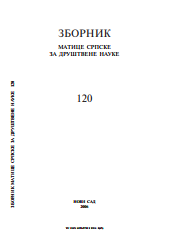ПРАВИЧНА ЦЕНА (ПРЕТИУМ ИУСТУМ) И ЊЕНА ПРИМЕНА ТОКОМ ИСТОРИЈЕ
IUSTUM PRETIUM AND ITS APPLICATION THROUGOUT HISTORY
Author(s): Magdolna Sič (Szűcs)Subject(s): Economy, History of Law, Economic history
Published by: Матица српска
Keywords: iustum pretium; laesio enormis; bona fides; Roman law; ius commune; fair price; consumer protection; unfair contract clauses;
Summary/Abstract: In this paper, without going into detailed theoretical considerations, we gave only the main development of thoughts about iustum pretium, as well as the outline of different methods of its realization through history, until today. The main problem is how to ensure the principle of equality between the contracting parties whose position is often unequal due to their different circumstances. The demand for equality of contracting parties in business relations and their mutual obligations (equivalence) was laid down by Aristotle in the early IV century B. C. Later the praetors have developed these principles, and they got their own further elaboration by pre-classical and classical roman jurists. Despite the fact that from the period of the Republic there already existed some sort of price control, mainly because of social reasons, the main rule was — that the price is just, if there is no lack of will one of the contractual parts: dolus, metus, error, or lack of experience in case of a person younger than twenty-five (minor), or women. They have considered in the first place the principle of bona fides in business relations. In modern theory, this concept is known as the subjective theory of the just price. In the post-classical period, due to special needs of poor small land-owners (in the period of Diocletian or Justinian) the seller of the land, who did not get even a half price of the value of a land sold, ewoyed protection even without its consideration and proving the lack of the will. Although there are only two provisions in Justinian's code about it, this rule, which was called laesio enormis in the Middle Ages (and founded the so-called, objective theory of just price), thanks to canon law mainly, with a lot of discussion in the Middle-Ages in theory and different solutions in practice, ius commune is accepted as a general rule. Modern codifications accepted in the first place the subjective theory about the just price. Somewhere in the sense of usury contracts (like in German BGB), or in combination with laesio enormis (for example, Code civil, ABGB, our Law of obligations), but only exceptionally, laesio enormis is accepted also in the objective sense (like in former Serbian Civil Code, and Hungarian Ptk.). We can say that today there is a tendency of wider interpretation of the bona fides in practice when solving the question of equality of values, all with the aim of weaker party protection, usually the consumer. Council Directive 93/13 EEC protects the consumer with a new, objective rule: the prohibition of one-sided unfair contract clauses: if the clause harms the consumer, neglects the bona fides requirements and if it results in considerable inequality in the rights and obligations of the contracting parties. A clause like that does not oblige the consumer. There is a tendency to apply this rule to all contracts, which means also on non-consumer contracts.
Journal: Зборник Матице српске за друштвене науке
- Issue Year: 2006
- Issue No: 120
- Page Range: 199-225
- Page Count: 27
- Language: Serbian

